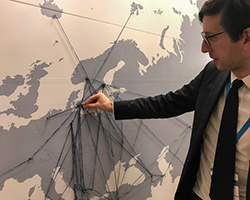Partners and expert networks

WHO
No single country and no single organization alone can protect people’s health in emergencies. An effective response is dependent on the work of many partners dedicated to improving the health and well-being of populations affected by crises. WHO recognizes that collective action optimizes its effectiveness and prioritizes partnerships at all community, national and global levels.
Integrated support for emergency preparedness across all sectors of government and society is paramount. Community engagement is essential both in preparedness and response to emergencies, and nongovernmental and private sector organizations all play vital roles in this activity.
Key partners of WHO in the European Region include: Member States; the European Union; United Nations (UN) agencies; the Red Cross and Red Crescent movement; the Global Outbreak Alert and Response Network (GOARN); the Global Health Cluster and other clusters under the Inter-Agency Standing Committee (IASC); Emergency Medical Teams (EMTs); expert networks; technical networks; standby partners; and many others.
Expert networks and interventions
WHO coordinates the work of health partners on the ground who are delivering medical supplies, providing health care, vaccinating communities and training medical staff. The Organization works with countries and partners to pre-position health professionals and other experts for rapid deployment.
- WHO has specific responsibilities and accountabilities within the global humanitarian system as the lead agency of the Inter-Agency Standing Committee (IASC) Health Cluster. WHO coordinates the Health Cluster at the global level and leads country Health Clusters when they are activated, ideally in co-leadership with the ministries of health. At country level, WHO looks to support and strengthen local actors, including nongovernmental organizations (NGOs) and other civil society groups. The work of other sectors/clusters – especially water and sanitation, food, nutrition, protection, animal health and husbandry, and security – is also vital in improving health outcomes during emergencies.
- The Global Outbreak Alert and Response Network (GOARN) is a WHO-established network of more than 200 technical institutions and networks globally. The international outbreak response is led by WHO through GOARN resources making sure that the right technical support and skills are on the ground rapidly where and when they are necessary. European GOARN partners contribute to major response operations and are deployed to monitor trends of diseases that could lead to outbreaks.
- WHO leads and coordinates the Emergency Medical Team (EMT) initiative globally and a number of EMTs in the European Region have successfully completed WHO’s verification process to respond to health emergencies. When health-related crises happen, WHO assists the ministries of health of affected countries to coordinate the arrival, registration, licensing, reception and tasking of EMTs. Both Health Cluster and EMT partners have important roles in building national capacities for preparedness and response.



